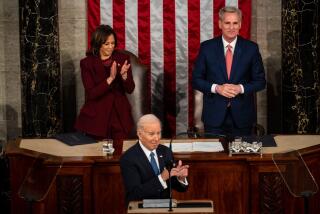Healthcare bills pose tax dilemma
- Share via
WASHINGTON — As Democratic leaders prepare to bring healthcare legislation before the full House and Senate for votes this month, they soon must decide who will be taxed to pay for expanding coverage -- the wealthy or the insurance companies.
Legislation emerging from the House would slap a surtax on upper-income people. But many Democrats, especially in the Senate, fear the political fallout over voting to raise anyone’s income taxes.
The most prominent Senate bill would impose a tax on insurance companies that provide expensive policies, sometimes dubbed “Cadillac” plans. But labor unions -- a powerful force within the Democratic Party -- bitterly oppose the idea, saying the tax would be passed on to workers in the form of higher premiums or shrunken benefits.
For months, much of the healthcare debate has been focused on whether there should be a government-run plan to compete with private insurers. About 10 million people would be expected to buy insurance through a public option, the nonpartisan Congressional Budget Office estimated.
But even more people could be affected by the outcome of the tax debate. The levy on insurers with high-cost plans could affect nearly 15 million households, according to the nonpartisan congressional Joint Committee on Taxation.
The question of how to pay for expanding Americans’ healthcare coverage is paramount, because President Obama has insisted that any plan not add to the federal deficit.
On Wednesday, the CBO released a report concluding that the Senate Finance Committee’s “Cadillac tax” and other funding provisions would more than offset the bill’s 10-year cost of $829 billion.
By the end of the week, House Democrats are expected to ask the budget office to analyze their version of the bill.
Legislation approved by the chamber’s Ways and Means Committee would impose an income tax surcharge of up to 5.4% on individuals who make more than $280,000 and on couples with more than $350,000 annual income.
That, however, did not sit well with centrist Democrats and others from high-cost regions. So House Speaker Nancy Pelosi (D-San Francisco) has called for raising the bill’s thresholds to $500,000 for individuals and $1 million for couples.
That and other tax proposals will be discussed in a closed-door meeting of the House Democratic Caucus today.
“It’s a big problem,” said a Democratic leadership aide who requested anonymity when discussing the healthcare negotiations. “People don’t like to vote for tax increases.”
But in the Senate, Democrats are even more wary of income tax hikes and have been trying to cover all the bill’s costs by finding savings from within the healthcare system. One target has been the tax breaks that the government gives to insurance plans that employers offer to their workers.
Under current law, health premiums paid by employers are deductible business expenses and do not count as taxable income for workers.
Liberal Democrats and labor unions vehemently oppose taxing health insurance benefits, and see the Cadillac tax as a backdoor way to do so. Labor groups also argue that their sometimes-generous benefit packages often have come in return for giving up pay increases.
The strength of that opposition was demonstrated Wednesday, when 157 House Democrats -- 60% of the party’s caucus -- sent Pelosi a letter opposing the excise tax.
But taxing some health benefits has found favor in the Senate. A bill being debated in the Finance Committee would impose a 40% excise tax on insurance companies for plans whose cost exceeds $8,000 for individuals and $21,000 for families.
Proponents argue that such a steep tax would create an incentive for insurance companies and employers to stop providing such expensive plans, thus helping to slow the growth of healthcare costs. And though companies may drop expensive plans, the CBO has said, the proposal nevertheless would raise revenues because it assumes employers who scale back coverage would repay workers by raising salaries or increasing taxable compensation in other ways.
The proposal also is politically appealing because the insurance industry is an inviting target. “There isn’t anything you could do to the insurance industry that wouldn’t be popular with the public,” said Drew Altman, head of the Henry J. Kaiser Family Foundation, a group that supports research on healthcare.
But critics say the excise tax is not, as a practical matter, a levy on insurance companies since the financial burden surely would be passed on to employers and then to their workers.
What is more, critics say, the plans affected are not all luxury models: The $8,000 and $21,000 thresholds may seem high, but a recent study by the Commonwealth Fund projected that the average premium for family coverage in 2015 would be nearly $20,000 in high-cost states.
The tax also would hit plans that are expensive not because they offer more extensive benefits but because they cover people in states such as California where healthcare costs are higher than average.
--
More to Read
Get the L.A. Times Politics newsletter
Deeply reported insights into legislation, politics and policy from Sacramento, Washington and beyond. In your inbox twice per week.
You may occasionally receive promotional content from the Los Angeles Times.











